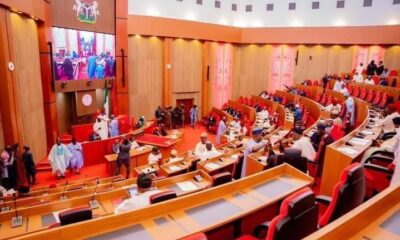News
FG moves to repatriate 15,000 stranded Nigerians from abroad

The Federal Government is working on plans to facilitate the voluntary return of around 15,000 Nigerians currently stranded in Cameroon, Niger, Chad, and other nations, according to the National Commission for Refugees, Migrants and Internally Displaced Persons (NCFRMI).
Speaking during a press briefing in Abuja on Friday, Federal Commissioner of the NCFRMI, Tijani Ahmed, said efforts are being intensified to ensure that returnees are brought back home safely and with dignity.
Mr. Ahmed noted that within Nigeria, approximately six million individuals remain displaced, while many more citizens are living as refugees abroad.
“We have 15,000 Nigerians that want to return to the country voluntarily and we also have not less than 100,000 foreigners living in this country as refugees. All these are the responsibilities of the commission, to give them support,” he stated.
He expressed appreciation to President Bola Tinubu for the administration’s continued backing of the commission and the Ministry of Humanitarian Affairs, emphasizing the government’s commitment to protecting displaced persons.
As part of ongoing regional efforts, Nigeria is set to host its first thematic session since assuming the chairmanship of the Rabat Process, a Euro-African dialogue focused on migration and development. The meeting, scheduled for May 13 and 14, is expected to welcome over 100 delegates from 57 partner countries.
Mr. Ahmed explained that the gathering will be centered on the theme, “Youth, Innovation and Education: Driving the Future of Migration,” and will provide a platform for strengthened bilateral engagement and improved migration governance.
“Membership in these platforms provides opportunities for knowledge transfer and better migration management. Nigeria’s leadership in the Rabat Process is seen as an advantage, despite its being a one-year term,” he added.
He further pointed to the significant challenges involved in managing migration, highlighting the need for targeted advocacy, especially among youth, to promote awareness about legal migration pathways.
“There is a need to educate migrants about the consequences of irregular migration, including negative outcomes. The focus should be on advocating for legal migration pathways to reduce the number of irregular migrants. Regular migration involves moving through legal channels, while irregular migration often involves dangerous and illegal methods. Irregular migration can lead to hardship and danger, with many migrants unable to return to their home country,” he said.
Ahmed concluded by urging stronger coordination and support from all stakeholders—including the media—to boost efforts in managing migration more effectively.





















